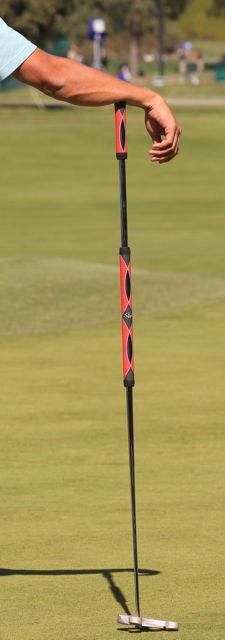"Finchem...opened the door to various forms of rebuttal."
/With nearly 800 votes cast, 72% of readers here were not impressed with the case made by Commissioner Tim Finchem to oppose the USGA/R&A proposed ban on anchoring.
And also not impressed was ESPN.com's Bob Harig.
He pretty much dismantles three of Tim Finchem's key arguments for opposing the ban, from the preposterous claim that 20% of golfers use a long putter or anchor, to more nuanced stuff like previous USGA statements, and even the criticism (yours truly included) that governing bodies refused to cite stats for a performance-driven rule change.  Most interesting to me was taking on this notion that players have grown up anchoring and would essentially be victims of the big, bad governing bodies if the rule goes into effect. Harig writes:
Most interesting to me was taking on this notion that players have grown up anchoring and would essentially be victims of the big, bad governing bodies if the rule goes into effect. Harig writes:
3. Finchem said in his news conference on Sunday that "a number of players on the PGA Tour who have grown up with a focus on perfecting the anchoring method did so after the USGA, on multiple occasions, approved the method years ago and that for us to join in supporting a ban we think as a direction is unfair to both groups of individuals."
There are two points here. First, there are but a tiny few players who have "grown up" with the anchoring method. Carl Pettersson and Tim Clark are two quick examples of players who have anchored for years; Clark says a deformity in his wrists makes it very difficult for him to putt in the conventional manner.
Anchored putting has risen in the past decade, but nearly everyone you see anchoring today -- Ernie Els and Adam Scott, for example -- putted conventionally, and did so for years.
Really, how many of the well known anchorers "grew up" with a belly putter jammed into their abs?
And maybe Finchem's most nuanced whopper, also dissected by Harig:
Both in his news conference and on television, Finchem made reference to the governing body taking two separate looks at the issue. But only once has the USGA made a statement regarding long putters, and that came in 1989. It said at the time that long putters were not going to be regulated. The focus then was in equipment, not the stroke, and they said it was more about helping people who had physical ailments like back problems than trying to change how the game is played.
After you read Harig's piece I think you'll ask the same question I did: half-truths and outright dishonesty were the best a man of intelligence and intense political savvy could muster as he committed a cardinal sin against a tournament sponsor?
I'm beginning to think Finchem really doesn't care either way how this plays out, he's merely covering his tracks with the minority of anchorers who are threatening lawsuits. But if that was the case, he would not have gone so public with so much misleading or erroneous information that could be waived in his face.
Strange times indeed.











